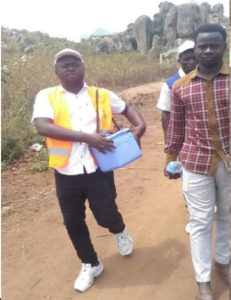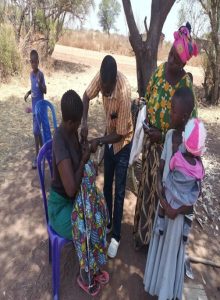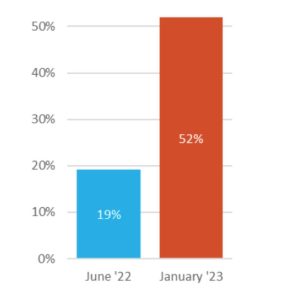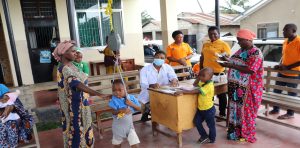Integrating COVID-19 Vaccination into Routine Immunization & Service Delivery
Vaccination Action Network: Local Solutions to Catalyze Change
 The introduction of the COVID-19 vaccine in Tanzania was launched in the Dar es Salaam region on July 28, 2021, and as of January 2023, 52% of adults 18 and older are fully vaccinated. Health officials leading vaccination efforts were initially concerned primarily with managing supply issues, building demand by communicating the risk of disease, and countering misinformation. However, as vaccination efforts have progressed, the greatest challenges they now face are related to maintaining routine immunization and other health services while continuing COVID-19 vaccination services and reaching hard-to-reach populations.
The introduction of the COVID-19 vaccine in Tanzania was launched in the Dar es Salaam region on July 28, 2021, and as of January 2023, 52% of adults 18 and older are fully vaccinated. Health officials leading vaccination efforts were initially concerned primarily with managing supply issues, building demand by communicating the risk of disease, and countering misinformation. However, as vaccination efforts have progressed, the greatest challenges they now face are related to maintaining routine immunization and other health services while continuing COVID-19 vaccination services and reaching hard-to-reach populations.
In order to meet these needs, COVID-19 vaccination was integrated with routine immunization and other health services in several districts in Tanzania. At an October 2022 meeting of the Vaccination Action Network, Dr. Mwanahamisi Hassan, the COVID-19 and Global Fund Coordinator with the President’s Office – Regional Administration and Local Government Tanzania, shared integration approaches used in Tanzania, with the hope that shared learnings from different countries can be used to build a new model of integration based on best practices.
“While thinking about how to
create an integration model for
Tanzania, we must recognize there
is no model for reference to build
from. Here is where learnings from
others in creating this new model
can help.”
Reaching High-Risk Groups
“As a country, we decided to categorize at-risk groups, which included healthcare workers who need COVID-19 vaccination, those with chronic diseases such as HIV, and the military,” shared Dr. Hassan.
For healthcare workers, strategies focused on data-driven sensitization and access. By reviewing high volume facilities with low vaccination coverage among their staff, targeted outreach was possible to conduct on-site sensitization meetings and provision of vaccination services. Sharing facility-level comparisons of vaccination coverage with the healthcare workers also helped encourage vaccination, as they saw their peers had accepted the vaccine. Health facilities were further supported with vaccination equipment and tools, such as cool boxes, transport allowances, educational materials, and monitoring and evaluation tools.
As PLHIV is considered a risk group, through the collaboration of partners and a few councils, vaccination services were integrated with HIV programs and clinics, including Prevention of Mother to Child Transmissions (PMTCT), Care and Treatment (CTC) centers, Provider-Initiated HIV Testing & Counselling (PITC) and Community ART and Index Testing services. Healthcare workers within these service areas were trained on providing COVID-19 vaccination, the benefits of COVID-19 vaccination benefits, and how to dispel vaccine misinformation. Additionally, checkout desk procedures and job aids were updated to include a check on COVID-19 vaccination and ensure no patients were missed. As needed, the MoH worked through implementing partners to temporarily hire dedicated staff for vaccine provision, allocated to CTCs, PMTCT clinics, and TB/HIV clinics, and increased the frequency of mobile vaccination teams by working with community-based HIV service providers (CBHSPs).

This hard work has paid off. As of December 1, 2022, Dr. Hassan shares that 98% of total PLHIV have been fully vaccinated and 90% of all health facility staff have been fully vaccinated – increased from approximately 10% of PLHIV and 50% of facility HCWs at the start of 2022.
Incorporating Routine Immunization Needs
The strategy of reaching high-risk groups for COVID-19 vaccine efforts during routine health care was so successful that a similar strategy was used to reach other community members. While COVID-19 vaccination is only available for those ages 18 and above in Tanzania, routine immunization outreach and services expanded to include COVID-19 education and vaccination for adults not vaccinated for COVID-19.
Many regions in Tanzania were not only working to increase COVID-19 vaccination coverage but were also experiencing declines in routine immunization due to misinformation and fear of reactions to vaccines. Education, awareness and demand creation activities continued to address these challenges, combatting myths about vaccination and stressing the importance of completion of immunization schedules. Vaccine ambassadors were influential voices to provide information on both COVID-19 and routine vaccines, including government and religious leaders conveying their commitment to vaccination goals.
A microplan was developed to both identify unreached children for routine immunization and adults not vaccinated for COVID-19. The number of vaccination sites were increased, and vaccine supplies were delivered to other healthcare facilities to be offered during routine checkups. Most effectively, door-to door campaigns were conducted with support from implementing partners in collaboration with local leaders, CHWs, and HCWs, in which the vaccination status of both parents and children were ascertained. The HCWs and CHWs were equipped to provide COVID-19 vaccines to adults during these campaigns and referred unvaccinated children to vaccination sites.

Taking Action to be Protected
While recognizing that these campaigns are an expensive approach to vaccination, Dr. Hassan noted that the integrated approach, incorporating both comprehensive messaging and service delivery for COVID-19 and routine immunization, succeeded in high coverage of COVID-19 vaccination, routine vaccine distribution using COVID-19 vaccine support, and increase of community awareness of both COVID-19 and routine vaccines. High leadership support and motivation of HCWs and CHWs were also important success factors to support sustainability of services.

But this sustainability also depends on building a more integrated health system. Tanzania has begun to address this by incorporating vaccination data collection into current systems – most health facilities have now added the COVID-19 vaccination record system. “Now we are working to have one message across all health services and creating a data collection system that can comprise all the different health services offered to an individual in one dataset” notes Dr. Hassan.
Dr. Hassan encourages others to create integration models. In Tanzania, she notes, steps are being taken to finalize their model to integrate services and messaging, working with government leaders and councils along with implementing partners. This teamwork and commitment, she adds, has been particularly effective in coordinating activities and providing resources – including developing comprehensive plans for immunization over the life course, routine immunizations, HPV, and COVID-19 immunization.

Dr. Hassan shares, “while thinking about how to create an integration model for Tanzania, we must recognize there is no model for reference to build from. Here is where learnings from others in creating this new model can help.”
 Contributor
Contributor
This story was shared by Dr. Mwanahamisi Hassan, Regional Administration COVID-19 and Global Fund Coordinator Tanzania. In this role, Dr. Hassan works with the President Office- Regional Administration and Local Government. She has both clinical and administrative experience for more than 15 years working in public hospitals and as a district medical officer in various districts.
Vaccination Action Network
The Vaccination Action Network (VAN) is an Africa-led action-oriented collaborative that brings together vaccination leaders and senior public health officials to solve the toughest challenges in improving COVID-19 vaccine demand and uptake across Africa. VAN provides a space for learning and peer exchange among immunization practitioners, focusing on demand-related challenges, best practices, and lessons learned that are specific to the local context. Local Solutions to Catalyze Change share interventions implemented by VAN members to improve COVID-19 vaccine uptake.

